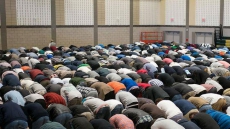It’s difficult to talk about the healing powers of music without slipping into familiar cliches about it. And, especially, when it comes to Sarod Maestro Amjad Ali Khan’s beatific compositions, words are wholly insufficient descriptors.
Born to Haafiz Ali Khan, himself a towering figure in Indian classical music, Amjad Ali Khan’s ethereal melodies take us back to the bare essentials. Unlike the sprawling concert performances we are accustomed to, his is a music that isn’t a cacophony of sounds but an elegant, effortless rapture. Joined on stage by his two sons, Amaan and Ayaan, he is part of a trio that has delivered enchanting performances across continents and reawakened audiences to the meditative and contemplative powers of music.
Today, the Khans are inarguably the greatest exponents of the Sarod, an India instrument of Afghan and Persian origins. With the Sarod, they bring back the timeless, ancient melodies that once echoed throughout the syncretic cultures of Persia, Central Asia and the Indian Subcontinent.
This year, the Khans will be in Vancouver to perform at The Orpheum Theatre on July 15.
Indian Summer Festival (ISF) spoke to Amjad, Amaan and Ayaan Ali Khan about their influences, the power of music and their illustrious position in the pantheon of classical music.
The history of Sarod is synonymous with your family's legacy through the generations. Growing up, was there an expectation that you were supposed to carry on the family tradition or did you make a conscious decision to dedicate your life to music?
Amjad Ali Khan (AAK):I cannot remember a particular day that I was initiated into the world of music. It was a part of me from as early as I can remember. Indeed, I cannot think of a moment when music has been separated from my life. For my father Haafiz Ali Khan, though, there was no question of a life outside music.
Life itself was music and music was life. And so I came to inherit from him the legacy of five generations of musicians as naturally as a bird taking to the air.
Music is the greatest wealth that I inherited from my forefathers, one that I am constantly sharing with my disciples. I believe in blessings and hard work. We can only do our best and leave the rest to the power up there. Like cosmic divinity, music knows few barriers or boundaries.
However, often in the race for cultural superiority, we pit one order against the other. The anti-thesis of this conflict phenomenon is fusion music, a rage among the current generation of music-lovers, which sees the world as a global village.
I have always admired and enjoyed listening to European classical musicians like Beethoven, Bach, Brahms, Russia’s Tchaikovsky. Our renditions are often compared with jazz, which is not misplaced. There is scope for improvisations in both the disciplines, but in a different manner.
The message of Indian Classical music is freedom within the discipline. My Sarod concerto for example has been aimed to preserve the essence of both Indian and Western traditions so that they can flow into each other without artistic compromise. The aim through this process is to joyfully explore the common musical DNA of both traditions.
Amaan:When we were growing up, our father would always be very happy to see us listen to music, not just practice it. Not just his own music, but the music of an entire range of artistes from the era of our grandfather to the contemporaries of our father.
We were never asked to listen to a particular artiste, or not to listen to another; to listen only to classical music and not to listen to the music of the West or Bollywood. The choice and the freedom was entirely ours. But it is only natural to be influenced by the music that your guru speaks of or refers to when he plays.
We thus became engrossed in the world of Indian classical music that our father had grown up with, along with our own contemporary choices.
Ayaan:To be a musician is in itself a blessing as you are really not answerable to anyone but yourself. For those few hours when you are on stage, you are in a creative frenzy - one that is sometimes supernaturally unreal. There are times when you get off stage only to realize that something special happened up there on stage that day.
It’s a blessing to be in a profession of what you love doing. It is also a non-debatable factor that music is indeed the best way to connect to that supreme power that we have never seen. Be it any religion, music has always been the pathway to spirituality.
You have often said that there are two kinds of music: One, which is based on language, lyrics and text, and the other, which is based on pure sound. You prefer the second kind because you’ve said “Language can create barriers”. Could you please elaborate on this?
AAK:Music is essential for the mind and the body. Pure music from the Sarod, violin etc. is heard with concentration and restoresbalance. People today need more than ever to cope with tensions, distress, depression; they struggle to find peace and relaxation. Music helps to retune one’s system.
That is why eminent doctors and psychologists are prescribing certain types of music as a form of therapy and treatment for stress disorders. Noisy music, on the other hand, can be damaging to both mind and body. In Western classical music, a composer scores a composition which is read and sung or played by the vocalists or musicians.
In the Indian classical system, there is no written or scored music. It would be extremely difficult to record and subsequently interpret the subtle nuances on paper. We therefore follow an oral tradition.
ISF: How does the father-son-brother relationship affect your musical collaborations? Do you find that you are better at intuiting each other musically than if you were performing with other musicians?
AAK: I am grateful to God that he has given me Amaan and Ayaan. My years teaching them have been quite an experience. In a family where music is a way of life, and fundamental to it, training in its intricacies starts from the moment a child is born. When I held Amaan for the first time, I sang into his ear. On Ayaan’s arrival two years later, I did the same. In essence, their training started from that moment, soon after their birth.
From the day they came into the world, they were both drawn to music. Perhaps, a wise parent would not allow two sons to play the same instrument, but because music is the only wealth I inherited from my forefathers, I wanted to share it equally with both of them.
As a teacher, it was the first time I was able to hold a student on my lap. As time progressed, their training, and the musical knowledge that I have tried to pass onto them, continued in our music room. In the course of Amaan and Ayaan’s training, which is an ongoing process for a classical musician, I never encouraged them to copy my style.
As they matured as musicians, I was relieved to see that both the brothers were developing an approach that was distinctive and rather different from what they were taught. This,I feel, is only natural, for the music that an individual creates is a reflection of his or her mind and soul.
Over the years, Amaan and Ayaan have received immense love and blessings from people in India and all over the world. For lot of young people, Amaan and Ayaan have become role models. I feel I too have learnt a lot while teaching them. Today, besides playing classical music, Amaan and Ayaan have made albums of experimental music too.
I have really enjoyed their collaboration with guitarist Derek Trucks, percussionist Evelyn Glennie, and cellist Matthew Barley. Subhalakshmi and I always hope to see them progress, be successful and happy. By the grace of God, they have matured into multi-faceted personalities.
I am sure that by the blessings, love and encouragement of music lovers, they will achieve their goals and everything what they deserve and desire.
With time, Amaan and Ayaan have become my closest companions in the music industry. Most of our concert tours, especially the ones overseas, are together, and as a result we have been able to spend immense quality time, both as father-son and teacher-disciple.
All concerts have been memorable, from numerous ones at the Carnegie Hall in New York, the Royal Festival Hall in London, the Sydney Opera House in Sydney, the John F. Kennedy Center for the Performing Arts in Washington D.C., the Orpheum Theater in Vancouver, among many others.
Ayaan:Music is our life. From the time we were born the language spoken was music, the air that we were breathing was music. We took shape of the vessel like water. Though our father has been a very strict traditionalist, he’s always believed in adapting to change.
In all honesty, Indian classical music has no rules about how it should be presented or executed. That’s very individualistic. Over the years we have tried our best to make the Sarod reach out to a new audience, to listeners that perhaps would not be at a classical concert!
Amaan:It’s a blessing to be on stage with my father. I make humble suggestions but it’s entirely up to him to agree or not. Though, he’s very open to it. It’s different with my brother. Any form of music is individualistic and till you play solo you’ll never know what is good and what is bad.
We both started off as soloists. In time, a lot of concerts and tours started and TV happened back in 1999, and before we could realize what was happening, we got clubbed togetherHowever, when we play together, there’s a lot of interaction. That said, it was not a pre-planned thing to become this ‘Sarod duo’ that we’ve ended up becoming.
It just happened; perhaps something destiny planned. However, even today there are many presenters who come to us and say that they want a solo.
Did you ever harbor any dreams of joining the music industry or branching out on your own?
Amaan:We have been very fortunate to have received so much love and adulation from music lovers all over the world. It’s such a long journey! Sky is the limit. The main mantra is that we have never taken any concert for granted. You are as old as your last concert and every concert is the first concert of your life.
We have done many collaborations in the past with Allman Brothers band guitarist Derek Trucks, American Folk song writer Carrie Newcomer, Grammy nominated Oud player Rahim Alhaj and also with the National Youth Orchestra of UK, London Philharmonia and the Avignon Philharmonic Orchestra. Today, classical concerts sell out all over the world. We need to understand that this has been a very intimate art form, initially not meant for masses.
It was only post the aristocratic era that it opened its doors to the masses. Like one can’t compare cricket and chess, you cannot compare Bollywood to classical music. It’s like comparing sushi and chicken tikka! Today there are maximum numbers of youngsters learning music and also performing at all levels including posting themselves on you tube!
Ayaan:We have been fortunate to have played all over the world in some great venues. The ones I love are Carnegie Hall, Royal Festival Hall, Wigmore Hall, Sydney Opera House and so many in Europe.



